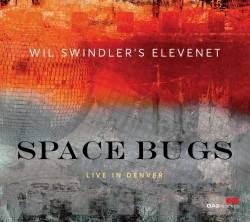MUSIC REVIEW BY Jack Bowers, All About Jazz
Space Bugs is essentially multi-layered yet readily accessible chamber jazz admirably performed by saxophonist/composer Wil Swindler's Colorado-based Eleventet—a finely woven banquet for the ears that was handsomely recorded in May 2022 before an appreciative audience at Denver's Mighty Fine Productions. Gil Evans springs to mind when listening, as do Pete Rugolo and late- career Bob Brookmeyer.
As a composer, Swindler writes that he has "always been between worlds," loving "the pristine intervals and warm timbres of orchestral jazz" as well as "the adventurous freedom of small group jazz." The Elevenet was designed to bridge those worlds and amplify the pleasure and beauty found in each. How close Swindler and his colleagues have come to reaching that goal is for the listener to decide. At least one more than casually involved eavesdropper is ready to give the enterprise an explicit thumbs-up.
That assessment is based in part on Swindler's engaging compositions and arrangements and even more so on the expertise of his ensemble and the inclusion of two more beguiling themes, the Beatles' enticing "Julia/Blackbird" and Regina Spektor's rhythmically charming "Pavlov's Daughter." Swindler composed the other half-dozen numbers, opening with a brace of lustrous and lyrical tone poems, "Passage" and "The Real Me," showcasing tenor Peter Sommer on the first, Swinder (alto sax) and pianist Ben Markley on the second (which is loosely based on the standard "I'll Remember April"). "Space Bugs," which is meant to depict an invasion by other-worldly insects (and does so as well as could be expected), features Sommer, Markley and trumpeter Gabriel Mervine with superb drum work by Dru Heller, as is the case on "The Real Me" (using brushes) and elsewhere.
The even-tempered "Annika" (Swindler on soprano) was written for his daughter, while the surprisingly mellow "Tantrum in D" (solos by Mervin, Sommer and trombonist Darren Kramer) is, according to Swindler, "a description of what it is for a person to be overwhelmed"—and, apparently, having a generally laid-back tantrum. Swindler's other composition, "Little Requiem," on which he solos on soprano, is measured and solemn, as a requiem should be. As noted, the ensemble is ship-shape, while the soloists (especially Swindler and Sommer) are consistently sharp and engaging. For those who admire the beauty and color of chamber jazz but cherish creative improvisation as well, Space Bugs is the whole package, meticulously presented and carefully wrapped by Swindler and his intrepid Eleventet.
As a composer, Swindler writes that he has "always been between worlds," loving "the pristine intervals and warm timbres of orchestral jazz" as well as "the adventurous freedom of small group jazz." The Elevenet was designed to bridge those worlds and amplify the pleasure and beauty found in each. How close Swindler and his colleagues have come to reaching that goal is for the listener to decide. At least one more than casually involved eavesdropper is ready to give the enterprise an explicit thumbs-up.
That assessment is based in part on Swindler's engaging compositions and arrangements and even more so on the expertise of his ensemble and the inclusion of two more beguiling themes, the Beatles' enticing "Julia/Blackbird" and Regina Spektor's rhythmically charming "Pavlov's Daughter." Swindler composed the other half-dozen numbers, opening with a brace of lustrous and lyrical tone poems, "Passage" and "The Real Me," showcasing tenor Peter Sommer on the first, Swinder (alto sax) and pianist Ben Markley on the second (which is loosely based on the standard "I'll Remember April"). "Space Bugs," which is meant to depict an invasion by other-worldly insects (and does so as well as could be expected), features Sommer, Markley and trumpeter Gabriel Mervine with superb drum work by Dru Heller, as is the case on "The Real Me" (using brushes) and elsewhere.
The even-tempered "Annika" (Swindler on soprano) was written for his daughter, while the surprisingly mellow "Tantrum in D" (solos by Mervin, Sommer and trombonist Darren Kramer) is, according to Swindler, "a description of what it is for a person to be overwhelmed"—and, apparently, having a generally laid-back tantrum. Swindler's other composition, "Little Requiem," on which he solos on soprano, is measured and solemn, as a requiem should be. As noted, the ensemble is ship-shape, while the soloists (especially Swindler and Sommer) are consistently sharp and engaging. For those who admire the beauty and color of chamber jazz but cherish creative improvisation as well, Space Bugs is the whole package, meticulously presented and carefully wrapped by Swindler and his intrepid Eleventet.
Soundclips
Other Reviews of
"Space Bugs":
Papatamus - Cadence Magazine by Robert Rusch
Take Effect by Tom Haugen
DownBeat by Brian Morton
CirdecSongs by Cedric Hendrix
Jazz Weekly by George W Harris
